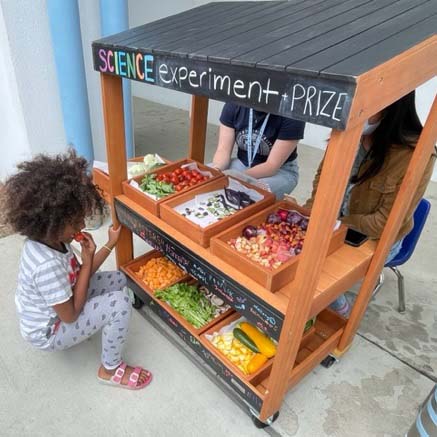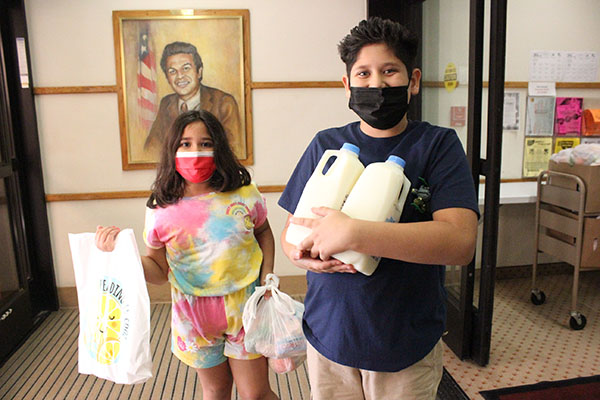Grant Opportunities
Libraries interested in participating in Lunch at the Library must apply for the Lunch at the Library Core Program. Libraries that apply for the Lunch at the Library Core Program may also apply for the Innovation grant.
Core Program
Applications for the Core Program are non-competitive. All libraries that take part in Lunch at the Library and submit approved applications will receive Core Program funds. These funds can support the following Lunch at the Library activities:
- Library Meal Sites: Establish and serve USDA summer meals at library site(s) and provide learning and enrichment programming at those meal sites. Lunch at the Library meal sites should include programming. Programs can include — but are not limited to — farm to summer, literacy, health and wellness, nutrition education, and arts and culture-based activities, as well as book provided to help families build home libraries.
- Pop-Up Libraries at Community Meal Sites: Take pop-up libraries — including programming, resources, and books — to other community-based USDA summer meal sites, such as local parks and schools.

Youth Development
Providing Youth Development activities for teens is an optional but beneficial component of Core Program services. Some libraries use Core Program grant funds to create scholarship opportunities for teens while others hire teens to the library staff as summer employees. Others have partnered with an outside agency that provides youth workers to support Lunch at the Library activities. Please be sure to review the list of Unallowable Expenditures on the Toolkit page for more information on scholarships. Reach out to California State Library staff if you have any questions.
Farm to Summer
Beginning Summer 2024, participation in Lunch at the Library includes the expectation of providing Farm to Summer activities. This means all participating libraries support efforts to connect children, teens, and families with locally sourced, sustainable food, and provide hands-on food education and enrichment activities.
Activities might include but are not limited to the following:
- Farm and/or gardening story time
- Building a garden
- Planting activities with vegetable starts or seeds
- Cooking/nutrition education
- Hosting a local farmer
- Visit to local farms (u-pick, stories at the farm, etc.)
- Composting and other sustainability activities
- Food education programs in settings that celebrate traditional foodways and cultivate food sovereignty.
For more program ideas, review the fact sheet Farm to Summer: Why Summer Meals Programs are Ripe for Local Foods and Agriculture-Based Activities from the USDA, learn from our partners at the California Department of Education, and watch our 2023 Farm to Summer Programming Session.
Innovation
The Innovation opportunity supports libraries in implementing innovative and often larger-scale efforts to connect more children, teens, and families with nutritious meals during the summer. Funded projects go above and beyond Lunch at the Library Core Program activities.

Think big and be as creative as possible when considering plans to connect your communities to nutritious meals during the summer.
Supported activities include but are not limited to:
- Becoming a summer meal convener in the community and developing and implementing strategies for connecting more families with nutritious meals during the summer through community collaboration and shared resources and services;
- Partnerships with Food Banks and other organizations to connect adult family members not eligible for the USDA program with nutritious meals;
- Community outreach, promotion, and awareness-raising;
- Partnerships with transportation services and other groups that help families get to meal sites;
- Innovative solutions for providing access to nutrition that supplements the USDA meal program; and
- Dedicated staff time for implementing the project.
Applications are competitive. As many applications as possible will be supported with available funds.
Review the following list of previously funded projects for further ideas.
- Anaheim Public Library: Provided pop-up site visits utilizing a Bookmobile and van at year-round food service locations.
- Inglewood Public Library; Worked with the Los Angeles Regional Food Bank to distribute bi-monthly produce boxes to families during the fall.
- Monterey County Free Libraries: Purchased a vehicle to become a mobile meal site.
- Nevada County Library: Worked with a local food bank to provide meals to areas without a USDA site available.
- Sacramento Public Library: Worked with Sacramento Food Bank & Family Services to provide food boxes to families.
- San Diego County Library: Worked with San Diego Hunger Coalition to host community food pantries at their branches.
- San Diego Public Library: Provided a shuttle service for unhoused families to and from the library and engaged in a promotional campaign to raise awareness about the program.
- Santa Barbara Public Library; Engaged in a targeted promotional campaign to connect with underserved communities.
- Sonoma County Library: Purchased a vehicle to provide pop-up site visits to tribal communities in rural areas.
